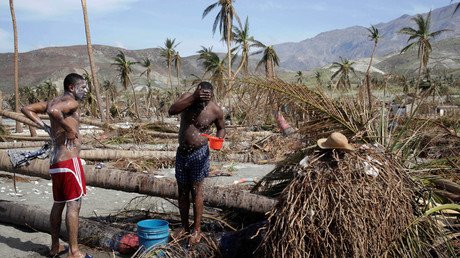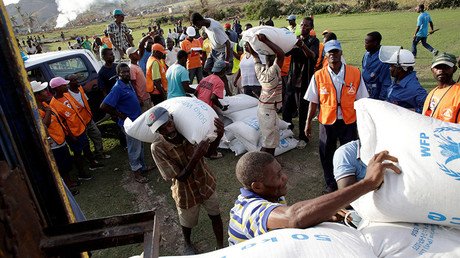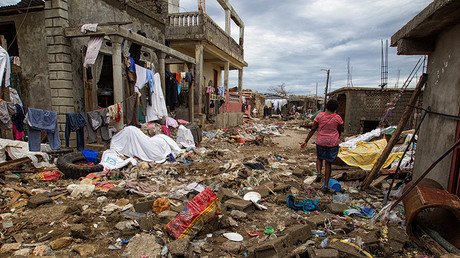‘Disaster capitalism’: Why Haitians prefer local NGOs over American Red Cross
Hurricane Matthew has left hundreds dead in Haiti and thousands in need of immediate relief. However, Haitians have not been making calls for American Red Cross donations. Former Haiti development worker France Francois explained why to RT.
In a report, ProPublica revealed that the American Red Cross basically raised half a billion dollars to aid Haiti after it was devastated by a monster 7.0 earthquake in 2010. It had only built six houses out of the promised 700 by 2013.
The problems remain to this day, former Haiti development worker France Francois told RT. She said Haiti became her last humanitarian posting, after which she left the industry altogether out of frustration with the lack of results.
“I think the American Red Cross is a good example of disaster capitalism,” she said, using the expression that was coined in the aftermath of the 9/11 attacks.
“There are a lot of other organizations that I am personally familiar with that have a terrible track record in Haiti … but the American Red Cross specifically is an example of an organization that does not have the capacity to do large-scale disaster relief and reconstruction correctly, but continues to collect resources and money to do so.”
After Hurricane Matthew, the situation in Haiti has quickly grown to resemble the previous crisis: deadly cholera cases are on the rise as the death toll has passed 1,000, while the government estimates that some 350,000 people are in need of urgent assistance.
In #Haiti, one in two affected by devastating #HurricaneMatthew is a child. pic.twitter.com/V9HxfM100S
— UNICEF (@UNICEF) October 8, 2016
Meanwhile, the US Red Cross said in a statement on its website that it deployed its teams to the affected areas in Haiti and is now “distributing a first round of life-saving relief supplies, including hygiene (cooking) kits, and cholera-prevention kits.”
It also claimed that it “is playing a key coordination role with local authorities and international humanitarian organizations to ensure life-saving support and supplies reach all those in need as soon as possible.”
At the same time, Haitians took to social media to urge people not to donate to the US Red Cross and to give the money only to local Haitian groups instead.
“In the coming days, many of you are going to write and ask me how you can 'help Haiti'. Here are my suggestions: 1. Don't give the American Red Cross…” a woman from Haiti wrote in a Facebook post.
People also shared a 2015 report by NPR and ProPublica, which said that the US-based charity wasted more than $500 million that was supposed to be for aid after the 2010 earthquake in Haiti.
Back in 2010, the problem didn’t start with the earthquake, Francois says. And if the faulty aid narrative is to be corrected, what Haiti needs is professionals who understand what the country had been before the quake, and continues to be to this day.
“Even before this disaster hit, what we Haitians wanted to do was take back the disaster-capitalist narrative, which always paints Haiti as waiting for a handout, waiting for the West to save us, and that’s not at all the case,” she told RT, adding that there are powers – the government among them – just waiting to “mobilize before the disaster hit, and will be there long after the cameras leave.”
The money, she says, “balloons” into huge packages full of benefits and privileges for the underprepared NGO staff – people who often don’t even have the language skills to connect with the locals.
Indeed, the 2015 report points to a trend of not hiring enough locals. More money went into paying high international salaries for arriving staff.
The local organization would not only have the know-how and capacity and language, but would be a lesser drain on finances.
“There are very, very few examples of quality housing built after the earthquake” these days, Francois says. There are still people living in tent cities, the long-term plan never came to fruition. And water-sanitation is visibly not prioritized, just as housing built to withstand future disasters.
“The earthquake was a lost opportunity for us Haitians where we thought the loss that came with the earthquake would give us the opportunity to really build a country able to withstand climate change, able to withstand all the effects of the impacts that Haiti continually faces,” Francois said.
The American Red Cross has continued to defend its work in Haiti, and blames the damning accounts of its work on bad reporting, while its chief Gail McGovern claims that “millions of Haitians are safer, healthier, more resilient, and better prepared for future disasters thanks to generous donations to the American Red Cross.”
For Francois, the recommendation not to give to the American Red Cross is not so much centered on that the Red Cross being incompetent, but on the fact that there are other organizations, local and otherwise, with a proven track record of working on the ground that would ensure there is less money spent on administration costs, and more going to the people who depend on the aid.















